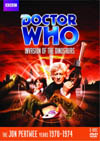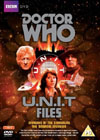DVD Features include:
The Moody Tangent of Part OneThe elusive first episode achieves a lonely, spooky, something's-not-quite-right atmosphere similar to the exposition of the parallel universe in "Inferno" (story no. 54) or Gatwick Airport's mystery from "The Faceless Ones" (story no. 35), and director Paddy Russell's production team succeeds remarkably well in bringing this to the screen. Such an atmosphere is definitely a worthwhile aim from the script. Is it actually a bonus that this moody first episode is so often presented to modern viewers in black and white? Does colour detract from the atmosphere? This episode hasn't quite been treated to the same restoration as part three of "Planet of the Daleks" (story no. 68), but at least we still have the black and white version to compare it with.Sadly, half of the Doctor and Sarah's episode one screentime is later padded with old routine capture-and-escape dynamics, once again unabashedly sporting Hulke's habitual bad-listener stereotype characters and the Doctor's resignation to the assumption that no one will believe him thus motivating him to not make much effort to explain himself properly. This revolting Hulke habit, however, is impossible to sustain with the Brigadier holding such a high-level influence in the situation, and indeed it is strange that it came up at all. Since the Brigadier has pinned all his hopes for progress on the possibility that the Doctor will turn up and give him some leads, you'd think that all the troops would have escorting him safely in written into standing orders, priority A1. Mike Yates gets strange treatment in episode one, particularly as he has such a pivotal chapter in his series character arc in this story. The novelization doesn't mention him at all in the episode one segments, while on television, he suffers a repeat of the problem he had in his debut episode in "Terror of the Autons" (story no. 55), namely that the camera can't seem to show the viewers his face no matter how much of a focus he deserves when delivering his lines. Weird. I also wonder why the production team thought they could keep the dinosaurs a secret by changing episode one's story title to just plain "Invasion". They may as well have left the story title the way it was! Thankfully, this is the last Doctor Who episode to suffer from a lack of proper archiving at the BBC - everything from here on is available complete in its original form....
Padding and ProductionEpisode Two is surprisingly progressive for a Malcolm Hulke story. Though I'll save discussion of as many plot details as possible for the in-depth analysis version of this review, the story begins to look like it will all get wrapped up rather quickly from here. But there are still four more episodes left to fill so Hulke spends a lot of time knocking our heroes back to square one over and over again. The struggle with this kind of conflict is that it may easily become repetitive and boring, or it may need to go off topic in order to remain interesting, or perhaps there is enough substance to the main issues at hand that being knocked backward and going through it again can give us some worthwhile depths to explore. This time around, Hulke's script does a bit of all of the above, even if it also has to do backflips and somersaults to hang on to the logic of it all. Sarah in particular has a completely new, interesting, thematically related square one to start moving forward from, which certainly works to keep audiences interested. It may not work quite as elegantly if you stop to consider the motivations of all the characters though. One of the distractions turns out to be a fair excuse to do some location action. Although the action is pulled off fairly well, it really does slow down the plot, and I have fallen asleep during this part of the story on one occasion. Some aspects of the story, though good for character development at first, start to get repetitive and boring, and it stretches credulity that such things could be successfully repeated anyway.The dinosaurs themselves are much maligned. Personally, I think most of the puppet monsters fulfill their character roles adequately. I mean, the brontosaurus is supposed to be large, placid, and stupid, and it is. Most of the other pleasant herbivores are equally successful in bringing their characterizations to life. It is chiefly the Tyrannosaurus Rex that lets the show down, because the required shots were simply not accomplished with him at all. He needs to be a major threat, therefore he needs to advance on camera POV's and move in on his prey or his attackers, and he's almost always either standing still or retreating. He really only works in a handful of shots when he is actually allowed to advance on the camera. The pterodactyl is a completely different process. His scenes manage to work, but aren't really inspiring either. Footage of the new Whomobile is surprisingly limited, but is nice to see.
A New Frame for the Trap of a Worthy ThemeThere's a lot of "doomsaying" in this story, but thankfully it gets a more balanced presentation this time around. Although one gets the sense that Hulke is voicing many of his own environmental and social concerns yet again, this particular script shows the one-sided, disgruntled system-bashing for what it is in the end, an indication that Hulke has gained more wisdom towards these issues than his earlier scripts may have let on. The Doctor's final statement on these issues, expertly zoomed in on, does a nice job of setting the record straight on Hulke's true beliefs. Unfortunately, screen time is still divided 95% on how not to solve society's problems, and 5% on a better way of going about it which is left a little vague, so the point can still easily be lost. "The Green Death" (story no. 69) gave about 50% of its philosophy time to Professor Jones and the Nut Hutch, expounding on some researched methods of doing things better, resulting in it having a greater and more memorable impact in the end.Although there is at least one very good character scene during the story's concluding moves, Hulke really cops out of delivering satisfying resolutions to most of the story threads he has built anticipation around. There is much to discuss on this matter, but we'll save those spoilers for the in-depth analysis version of this review.
A short list of Malcolm Hulke stories, ranked from best to worst:
-The War Games (with Terrance Dicks)
-The Silurians
-The Faceless Ones (with David Ellis)
-Colony in Space
-Invasion of the Dinosaurs
-The Sea Devils
-Frontier in Space
This story is available on DVD and VHS video. If you've only seen it on TV in syndication, they probably left out the REAL episode one. Get yourself all six episodes on DVD or VHS video and enjoy it closer to the way it was meant to be seen!
Comments on this article are welcome. You may contact the author from this page:
|
||||||||||||||||||||||||||||||||









